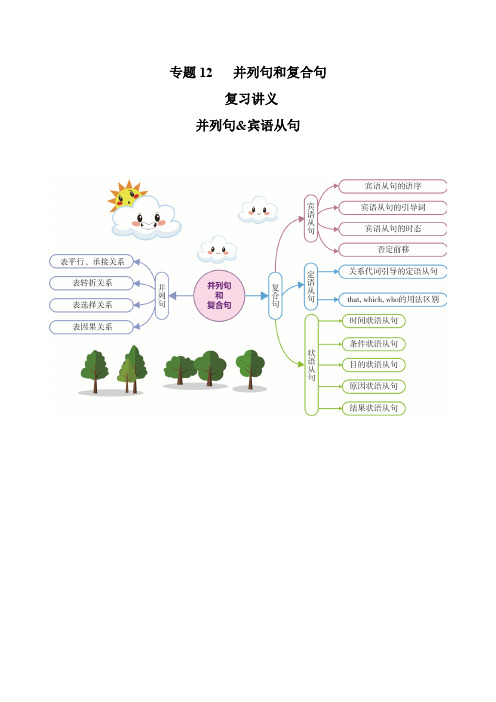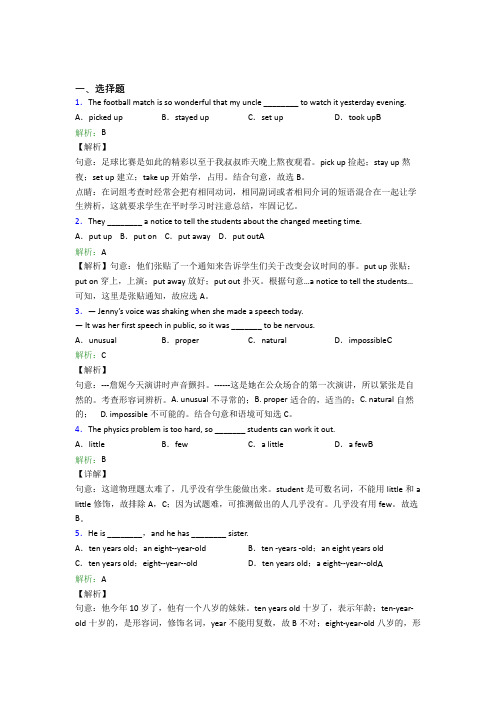第12节状语从句
人教版英语九年级上册Unit12-知识点详解

Unit 12 Life is full of the unexpected. 专题导入重点短语:by the time 在……之前 get up 起床be full of 充满give…a lift 捎(某人)一程go off 响铃 rush out 冲出wake up 醒来 at least 至少;反正be about to 将要 go on 发生;向前走stare at 盯着……看 in disbelief 怀疑地in line with (与……)成一排 turn into 变成take off 起飞 jump out of 从……跳下show up 赶到 by the end of 在(某时间点)以前get dressed 穿衣服 stay up 熬夜April Fool’s Day 愚人节 Costume party 化妆舞会sell out 卖光 take place 发生play jokes on sb. 和某人开玩笑 end up 以……结束get married to 和……结婚 run out of 用完知识点梳理Section Ais full of the unexpected. 生活充满了意外。
(标题)典例精讲①Our life is ______________chances, but there are also a lot of challenges.(充满)② The box is_______________(装满) books.③On hearing the news, her heart was _____ gratitude.A. filled ofB. full withC. filled withD. fill with【解析2】 unexpected adj. 出乎意料的;始料不及的the unexpected “意外的事情”“出乎意料的事”。
the +adj.表示一类人或事物。
九年级英语全册Unit12Lifeisfulloftheunexpected笔记重点大全(带答案)

九年级英语全册Unit12Lifeisfulloftheunexpected笔记重点大全单选题1、-It's cold outside, Jimmy! You should __________your sweater.-Thanks, mom.A.take offB.take inC.put onD.put up答案:C句意:——外面很冷,Jimmy。
你应该穿上你的毛衣。
——谢谢,妈妈。
A. take off脱下;B. take in吸入;C. put on穿上;D. put up张贴。
根据上文It's cold outside, Jimmy!可知下文是说穿上你的毛衣。
根据题意,故选C。
2、You have to leave now________you can catch the early bus.A.so thatB.as soon asC.becauseD.if答案:A句意:你现在必须出发,以便你能够赶上早班车。
考查连词辨析。
A. so that以便,为了,后跟表示结果的句子; B. as soon as一……就……:表示时间;C. even though即使,表示条件。
现在出发的目的是赶早班车,故选A。
3、Mr. Zhou is good at cooking and he has decided______his own restaurant.A.openB.openedC.to openD.opening答案:C句意:周先生擅长烹饪,他决定开一家属于自己的餐馆。
decide to do sth.决定去做某事,固定搭配。
故答案为C。
4、In every ________ there has to be some give-and-take. A.friendshipB.instrumentC.attentionD.blackboard答案:A句意:在每一段友谊中都必须有一些互谅互让。
专题12并列句和复合句(二)(定语从句状语从句)(复习讲义)-2023年中考英语二轮复习讲练测(全国

专题12 并列句和复合句复习讲义并列句&宾语从句由并列连词把两个或两个以上的简单句连接起来的句子叫并列句。
常见分类:1. 表平行或承接:and, both … and … , not only … but also … , neither … nor … , as well as等;2. 表转折:but, yet, while等;3. 表选择:or, not … but, either … or …等;4. 表因果:as, for, so等。
1.(2023·天津·模拟预测)The dress is very nice, ________it doesn’t look good on me.A.or B.but C.so D.until【答案】B【解析】句意:这件衣服很漂亮,但我穿起来不好看。
考查连词辨析。
or或者,表选择;but但是,表转折;so所以,表结果;until直到,表时间。
根据句意语境,可知本句前后是转折关系,需用but连接,故选B。
2.(2022·重庆渝中·重庆巴蜀中学校考三模)—What a heavy rain!—You’d better set out a little earlier, ________ you’ll be late for school.A.and B.but C.or D.so【答案】C【解析】句意:——雨下得真大啊!——你最好早一点出发,否则你会上学迟到的。
考查并列连词辨析。
and并且,和;but但是;or否则;so所以。
根据“You’d better set out a little earlier”可知你最好早点出发,如果不这样做的话,就会迟到。
因此应用or“否则,要不然”连接。
故选C。
3.(2022·天津红桥·统考模拟预测)The shops were closed ________ I couldn’t buy anything.A.so B.but C.so that D.after【答案】A【解析】句意:商店关门了,所以我什么都买不到。
人教版九年级英语下册Unit 12教案导学案有反思

Unit 12Life is full of the unexpected.第一课时Section A(1a-2d)Target Navigation【目标导航】Key words and phrases:unexpected,backpack,oversleep,give…a lift,by the time(that)Key sentences:(1)By the time I got up,my brother had already gotten in the shower.(2)When I got home,I realized I had left my keys in the backpack.(3)When I woke up it was already 8:00 a.m.!(4)Before I got to the bus stop,the bus had already left.Skills:能听懂别人叙述过去的事情,能初步运用由when/before/by the time(that)引导的时间状语从句叙述过去的事件。
Emotion:通过让学生叙述过去发生的事件,让学生学会倾听,学会关心别人。
The guidance of learning methods【学法指导】听说法,小组合作角色扮演。
Learning important and difficult points【学习重难点】1.能听懂别人叙述过去的事情。
2.能初步运用由when/before/by the time引导的时间状语从句叙述过去的事件。
3.掌握Key sentences中的四个句型。
Teaching Steps【教学过程】Autonomous Learning Scheme【自主学习方案】☞预习指导与检测(一)预习指导1.预习Page 89、90的生词和短语,根据音标会读记。
2.朗读Page 89、90的句子,能英汉互译。
《常考题》初中英语七年级下册Unit 12知识点总结(含答案解析)

一、选择题1.The football match is so wonderful that my uncle ________ to watch it yesterday evening. A.picked up B.stayed up C.set up D.took up B解析:B【解析】句意:足球比赛是如此的精彩以至于我叔叔昨天晚上熬夜观看。
pick up捡起;stay up熬夜;set up建立;take up开始学,占用。
结合句意,故选B。
点睛:在词组考查时经常会把有相同动词,相同副词或者相同介词的短语混合在一起让学生辨析,这就要求学生在平时学习时注意总结,牢固记忆。
2.They ________ a notice to tell the students about the changed meeting time.A.put up B.put on C.put away D.put out A解析:A【解析】句意:他们张贴了一个通知来告诉学生们关于改变会议时间的事。
put up张贴;put on穿上,上演;put away放好;put out扑灭。
根据句意…a notice to tell the students…可知,这里是张贴通知,故应选A。
3.—Jenny’s voice was shaking when she made a speech today.— It was her first speech in public, so it was _______ to be nervous.A.unusual B.proper C.natural D.impossible C解析:C【解析】句意:---詹妮今天演讲时声音颤抖。
------这是她在公众场合的第一次演讲,所以紧张是自然的。
考查形容词辨析。
A. unusual不寻常的;B. proper适合的,适当的;C. natural自然的; D. impossible不可能的。
人教版初中英语七年级下册Unit12SectionA教材全解

人教版初中英语七年级下册Unit12SectionA教材全解Unit 12 What did you do last weekend?Unit 12 Section A教材全解1.go boating去划船【重点注释】这是“go+doing”结构的短语,类似的还有:go swimming/fishing/shopping/skating/camping去游泳/钓鱼/购物/滑冰/野营。
2.camped by the lake在湖边野营【重点注释】①camp此处作不及物动词,意为“扎营,宿营”,常用短语go camping意为“去野营”,camp out意为“野营;露营”。
例如:We camped near the beach.我们靠近海滩宿营。
Where did you camp last night?昨晚你在哪里宿营了?They often go camping on summer holidays.他们经常在暑假去野营。
I went camping with my friends last Sunday.上星期日我和朋友们去露营了。
The students love camping out on summer holidays.学生们喜欢在暑假中露营。
【拓展记忆】camp还可作名词,意为“野营,营地“,可构成词组:summer camp夏令营,winter camp冬令营。
例句:Let’s go back to the camp.It’s getting dark.我们回营地吧。
天快黑了。
We had a good week at the camp.我们在营地过了愉快的一周。
Did you go to summer camp last year?去年你参加夏令营了吗?②by the lake在湖边,by此处是介词,意为“在……旁边”、“在……近旁”、“在……手边”,此时要注意它与介词near有所不同,即by表示的距离更“近”。
Unit 12教材思路分析人教版九年级英语全册

Unit 12 Life is full of the unexpected. 教学目标与要求一、话题Topic:难以预料的事情(Unexpected events)二、功能Functions:能讲述过去发生的事情(Narrate past events)When I woke up, it was already 8:00 a.m.Before l got to the bus stop, the bus had already left.As I was waiting in line with the other office workers, I heard a loud sound.By the time I got to the airport, my plane to New Zealand had already taken off.三、语法Grammar:1. 了解过去完成时(Past perfect tense)2. 语法复习(Review of key structures)能正确使用由when, before, as, by the time引导的时间状语从句表达过去发生的事情When I got to school, I realized that I had left my backpack at home.By the time I got back to school, the bell had rung.Before I got to the bus stop, the bus had already left.As I was waiting in line with the other office workers, I heard a loud sound.四、词汇和常用表达Words & expressions:1. 能正确使用以下词汇(Curriculum words)backpack, block, worker, airport, cream, pie, bean, market, fool, discovery, lady, officer, oversleep, ring, burn, cancel, disappear, unexpected, alive, believable, above, till, west2. 能正确使用以下常用表达(Useful expressions)by the time, give…a lift, in line with, show up, by the end of, costume party, sell out 3. 能认读下列词汇(Non-curriculum words)stare, disbelief, burning, workday, costume, embarrassed, announce, spaghetti, hoax, embarrassing, New Zealand, Italy, Mars五、学习策略Strategies:1. 利用本单元听力图片信息,预测听力内容2. 根据语篇中的段落首句,激活相关背景知识,预测文章内容六、文化知识Culture:了解国外愚人节风俗SECTION A 内容介绍Section A的中心话题是讲述发生过的意想不到的事情,涉及以下两个主要语言项目:●了解过去完成时态描述过去某一时间或动作之前已经发生或完成了的动作;●运用一般过去时态描述过去某个时间里发生的动作或存在的状态。
九年级英语人教版新课标Unit12. Life is full of the unexpected知识点详解..

Unit12. Life is full of the unexpected课文知识点详解Section A.1.Life is full of the unexpected. 生活充满了意外。
(标题)【解析1】be full of = be filled with充满,装满【解析2】unexpected adj. 出乎意料的;始料不及的the unexpected “意外的事情”“出乎意料的事”。
the +adj.表示一类人或事物。
英语中,有些形容词与定冠词the连用,表示一类人或事物,在句子中起名词的作用。
the homeless (无家可归者) the disabled(残疾人)2. By the time I got outside, the bus had already left. 当我出来时,公共汽车已经离开了。
(1b)【解析】by the time 在……以前,指从过去的某一点到从句所示的时间为止,常引导表示过去的时间状语从句,主句常用过去完成时,即had+动词过去分词。
By the time I got up, he had already left. 当我起床时,他已经离开了。
【拓展】by now 表示“到现在为止”,通常与现在完成时连用。
By now I have collected 200 dolls. 到现在为止,我已收集了二百个布娃娃。
3. When I got to school, I realized I had left my backpack at home.(1b)当我到学校时我意识到我把书包忘在家里了。
【解析】leave sth. +地点“把某物忘在某处”forget意为“遗忘某物”,指忘记一件具体的东西,但不能有具体的地点。
I left my book on the desk. 我把书忘在了桌子上。
I forgot my umbrella yesterday .我昨天忘了带伞。
- 1、下载文档前请自行甄别文档内容的完整性,平台不提供额外的编辑、内容补充、找答案等附加服务。
- 2、"仅部分预览"的文档,不可在线预览部分如存在完整性等问题,可反馈申请退款(可完整预览的文档不适用该条件!)。
- 3、如文档侵犯您的权益,请联系客服反馈,我们会尽快为您处理(人工客服工作时间:9:00-18:30)。
第12节状语从句知识点提示:掌握时间状语连词when, while, as, before, until, the moment, since ---;原因状语连词because, as, since, for, now that;地点状语连词where, wherever;目的状语连词so that, in order that, for fear that, in case;结果状语连词so---that, such---that, so that;条件状语从句连词if,unless(=if...not)(除非),so(as)long as(只要),in case(万一),on condition that(条件是),suppose/supposing(假设,用于问句),provided(that)等。
;让步状语从句连词although/though(尽管,虽然),even though/even if(即使)高考要求:掌握和熟练使用表不同情况的连词并能在写作中运用状语从句。
知识点梳理:1.时间状语从句(1)when,while和as①when既可引导一个持续性动作,也可引导一个短暂性动作,如:When I lived there.I used to go to the seashore on Sundays.我住在那里时,星期天常到海滨去。
When the film ended,the people went back.电影一结束,看电影的人便回去了。
②while引导的动作必须是持续性的,侧重主句动作和从句动作相对比,如:Please don’t talk so loud while others are working.别人在工作时,别高声说话。
③as引导一个持续性动作,多表示主句动作和从句动作同时发生,如:He hurried home,looking behind as he went.他匆匆忙忙跑回去,一边走一边回头望。
John sings as he works.约翰一边工作,一边唱歌。
④when还可用作并列连词,其前多用进行时或be about to结构,意思是:“这时”。
如:We were having a meeting when someone broke in.We were about to set off on our way when it suddenly began to rain.此外when还表示原因“既然”,如:It was foolish of you to take a taxi when you could easily walk there in five minutes.⑤while作为并列连词,意为“而,却”,表示对比。
He likes pop music,while I am fond of folk music.while还可表示“尽管”,相当于although位于句首引导让步状语从句。
While he was respected ,he was not liked.⑥如果主句表示的是短暂性动作,而从句用延续性动词的进行时态表示在一段时间内正在进行的动作时,when,while与as可互换使用。
如:When/While/As 1 was walking down the street.I came across an old friend of mine.(2)as soon as,immediately,directly,the moment,the minute,no sooner...than…,hardly/scarcely…when…,once(一……就……)。
这些从属连词引导的从句都表示从句的动作一发生,主句的动作随即就发生,常译为“一……就……”。
从句中用一般现在时态代替将来时。
如:Once you remember it,you’11 never forget it.The moment I heard the voice,I knew father was coming.No sooner had we arrived at the station than the train left.The boy burst into tears immediately he saw his mother.注意:no sooner…than…;hardly/scarcely…when…引导的主句谓语动词应用过去完成时,而than 与when的从句谓语动词应用一般过去时,此外,当把no sooner和hardly/scarcely提到句首时,应用倒装语序。
I had hardly got home when it began to rain.Hardly had I got home when it began to rain.(3)till,until和not…until①肯定句:主句谓语动词必须是延续性动词,主句、从句都为肯定式,意为“某动作一直延续到某时间点才停止”。
如:You may stay here until the rain stops.你在这里可呆到雨停。
②否定句:主句谓语动词必须是非延续性动词,从句肯定式,意为“某动作直到某时间才开始”。
如:He won’t go to bed till(until)she returns.直到她回来他才睡觉。
③till不可以置于句首,而until可以。
如:Until you told me I had no idea of it.直到你告诉我,我才知道这件事。
④not…until句型中的强调和倒装用法:Not until you told me did I have any idea of it.(not until置于句首主句要倒装)(4)before和since①若表达“还未……就……”“不到……就……”“……才……”“趁,还没来得及”时,需用连词before,如:We had sailed four days and four nights before we saw land.我们航行了四天四夜才看到陆地。
We hadn’t run a mile before he felt tired.我们跑了还不到一英里他就累了。
Please write it down before you forget it.趁你现在没忘把它记下来。
Before I could get in a word,he had measured me.我还没来得及插话他就给我量好了尺寸。
before从句中谓语不用否定式,又如:Before they reached the station,the train had gone.他们(还没)到火车站前,火车已开走了。
②It will be+时间段+before sb does“多久之后才……”,如:It will be half a year before I come back.It won’t be long before we meet again.③It was +时间段+before sb did“多久之后才……”It was ten years before they met again.比较:It is ten years since they met last time.④since从句的谓语动词一般是非延续性动词,主句的谓语动词是延续性的或者是表示反复发生过的动作。
since从句的时态若是一般过去时,相应地,主句中的时态是现在完成时或现在完成进行时。
如:I have written home four times since I came here.自从我到这儿来,我往家写了四封信。
⑤在It is+ +since延续性动词从句句型中,时间的计算一律从since从句的动作完成或状态结束时算起,如:It is three years since the war broke out.战争爆发以来,有三年了。
It is three years since she was in our class.她离开我们班有三年了。
It is three years since I(have)smoked a cigar。
(=since I stopped smoking a cigar).我不吸烟有三年了。
如果译成“我吸烟有三年了”。
应:It is three years since I began to smoke.(5)every time,each time,next time,the first time,any time,a11 the time等名词短语用来引导时间状语从句,表示“每当……,每次……,下次……”。
如:Every/Each time I was in trouble,he would come to help me out.Next time you come,do remember to bring your son here.The last time she saw James,he was lying in bed.The first time I climbed onto the wall.I felt nervous.You are welcome to come back any time you want to.同步练习:1.Don’t be afraid of asking for help______ it is needed.A.unless B.since C.although D.when2. That was really a splendid evening.It’s years______ I enjoyed myself so much.A.when B.that C.before D.since3.We were just______ calling you up______ you came in.A.about:when B.on the point of;whileC.on the point of;when D.on the point of;as4.________he finished his talk than he was taken away.A.Hardly had B.No sooner C.No sooner had D.Hardly did5.________the telephone rings,he gets nervous.A.Everytime B.Every time C.Next time D.Anytime答案:DDCBB2.地点状语从句(1)引导地点状语从句的从属连词where,wherever,如:We should go where the Party needs us most.You are free to go wherever you like.Where there is a will there is a way.有志者,事竞成。
